Informational Courses
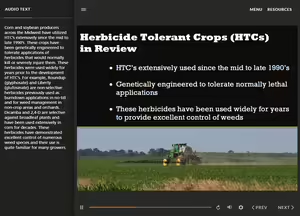
This online course is designed for pesticide applicators looking to better understand how to prevent herbicide injury. With an understanding of the off-target movement of herbicides and knowing which factors contribute to herbicide injury, applicators can more easily take preventative steps.
- Identify typical injury symptoms that result from exposure to PGR or auxin herbicides.
- Learn how to get injury diagnosis assistance.
- Identify resources for handling injured plants and communicating with neighbors.
This training also can serve those interested in preventing herbicide injury and promoting neighbor communications in regard to these issues.
Visit this online training course and click 'Login as Guest' for access. This free course was revised in May 2021.
Factsheets
- Tips for Certification Exam Preparation - by University of Illinois Pesticide Safety Education Program (2023)
- How to Handle Pesticide Drift Complaints: A Guide for Those Affected by Drift for Producers, Gardeners, and Home Owners - by University of Illinois Pesticide Safety Education Program (Revised 2025)
- NPDES Summary - by University of Illinois Pesticide Safety Education Program (2021)
- NPDES FAQ - by University of Illinois Pesticide Safety Education Program (2021)
- Pesticide Lookalikes: Avoid Accidental Pesticide Poisoning - by University of Illinois Pesticide Safety Education Program (2021)
- Making Pesticides Applications in School/Community Gardens - by University of Illinois Pesticide Safety Education Program (Revised 2021)
- Temperature Inversions - by North Dakota State University (Revised 2019)
- Top 12 Lawn and Garden Pests - by University of Illinois Pesticide Safety Education Program
Structural Pest Control Licensing

- For questions regarding structural pest control licensing, testing, training, or school IPM, please contact:
Illinois Department of Public Health (IDPH) Division of Environmental Health (217-782-5830). - Structural Pest Control Program website
- Frequently Asked Questions website
- The Pesticide Safety Education Program general standards exam and training are different than the general standards exam and training offered through IDPH and are used to obtain a different license.
- The Pesticide Safety Education Program general standards training can be completed to gain continuing education credits for an existing structural pest control license.
Illinois Resources
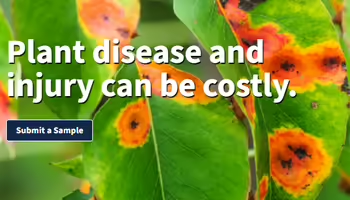
UofI Plant Clinic
Plant and insect identification, diagnosis of disease, insect, weed and chemical (on field crops only) injury, nematode assays, and help with nutrient related problems, as well as recommendations involving these diagnoses.
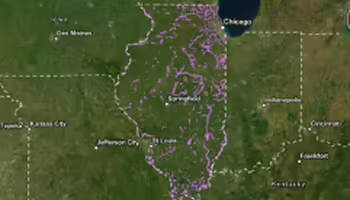
Natural Resources Awareness Tool for Applicators
An online mapping tool for identifying the location of the state’s natural areas, threatened and endangered species, and other sensitive areas to assist landowners, producers, and applicators with pre-application planning of herbicides and pesticides, to help prevent and manage off-target drift.
New Barrier Mosquitocide Law
Beginning in Jan. 2023, all operators and applicators applying residential barrier mosquitocides will be required to take Mosquito training. Visit the Illinois Department of Agriculture page about this law to stay up-to-date on these changes.

Pesticide Application on Rights-of-Way Notification Act (PARNA)
On January 1, 2025, a new law took effect that requires municipalities and government entities to provide at least 24 hours’ notice to the public before applying pesticides on a public right-of-way within the corporate boundaries of a municipality. Visit the Illinois Department of Agriculture page for more details.
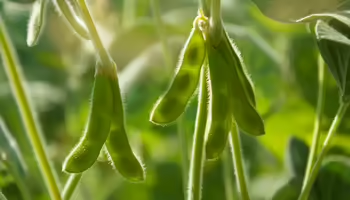
Dicamba on Soybeans
Visit Illinois Department of Agriculture's Dicamba page to stay up-to-date on laws, regulations and restrictions for applications of Dicamba in soybeans.
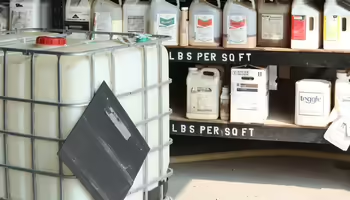
Clean Sweep Program
Free of charge disposal of unwanted pesticides which may be posing an unnecessary threat to their owners and to the surrounding environment. Collection sites rotate by county yearly. Registration is required.
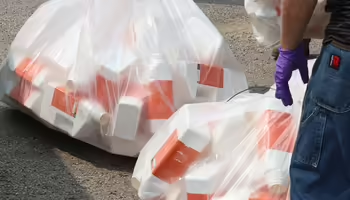
Agrichemical Container Recycling Program
Pesticide users can bring containers for granulation and shipment to a national contractor that utilizes the plastic for the manufacture of other agrichemical-related products.
National Resources
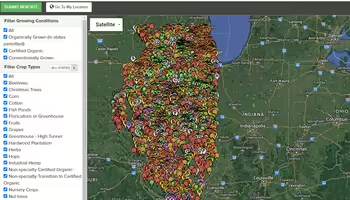
Driftwatch
A voluntary communication tool that enables crop producers, beekeepers, and pesticide applicators to work together to protect specialty crops and apiaries through use of mapping programs. This site can be used to identify sensitive sites nationwide.
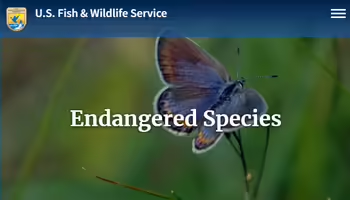
Endangered Species List
Search for threatened and endangered plants and animals by state, county or species. Provided by the U.S. Fish & Wildlife Service.

Temperature Inversions
Learn about the causes, characteristics and impacts of temperature inversions on pesticide drift North Dakota State University's website.

National Pesticide Information Center
Objective, science-based information about pesticides and pesticide-related topics to enable people to make informed decisions. Search for pesticide factsheets or speak to an expert.
Worker Protection Standard Compliance Assistance Library
Collection of educational resources to help people on farms, orchards, forests, and other agricultural establishments comply with the Worker Protection Standard (WPS).
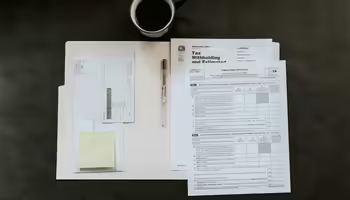
Pesticide Recordkeeping
Learn more about recordkeeping requirements by visiting the USDA's Pesticide Recordkeeping resource website.